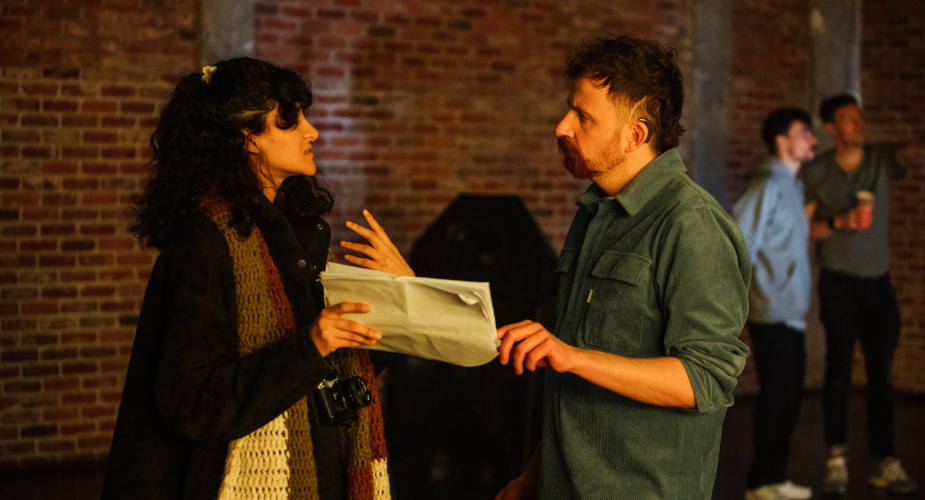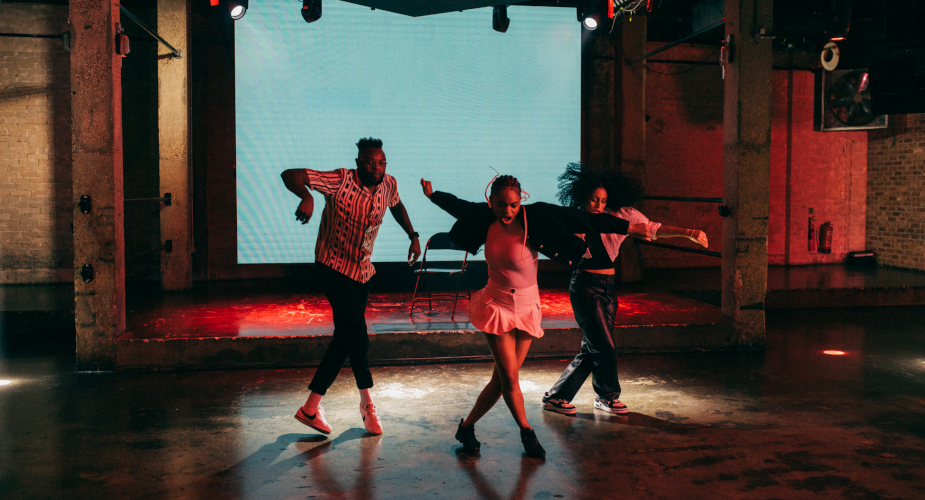
Behind Re/Sign, The Campaign That Combats Fake Sign Language Through Dance

Re/Sign is a social campaign dedicated to combating fake sign language online. It is the result of the combined efforts of deaf communications charity Signature and independent agency Recipe. Youmna Hazza, the creative who came up with the campaign, tells LBB more about its story.
Let’s start by clearing up what ‘fake sign language’ (or just ‘fake sign’) is – simply, inaccurate sign language. But, to understand how fake sign exists, we have to first understand the complexities of sign languages themselves, says Youmna, for whom the campaign started after she witnessed a woman struggle to communicate in A&E.
“‘Sign language’ isn’t a single universal language – you’ve got British Sign Language, American Sign Language and even International sign, to name a few,” she explains. “But within those, come a lot of intricacies, such as regional sign (dialects, if you will) or even specific nuances within families or friend groups. Teaching sign language requires a great understanding of those complexities and respecting the culture that the language represents, in the same way we should approach any language.”
Turns out, online and especially on TikTok, sign language is slowly turning into a ‘trend’, which has inevitably led to grossly incorrect usage. This means that people who most likely do not have the lived-experience with sign will attempt to teach it on and offline, leading to misinformation and cultural appropriation, further widening the gap between the deaf and hard-of-hearing communities and the hearing community. “Ultimately, no one benefits from that,” says Youmna.
Re/Sign wants to help the 89% of young deaf adults who have encountered fake sign language online, and end the widening communication gap. The campaign gained traction quickly with coverage in The Times and BBC Breakfast, but it wasn’t easy from the start – Youmna had to pitch what was essentially proactive work, or a passion project, on her own.
She tells LBB’s Zoe Antonov more about how this happened, why Recipe came on board and more.
LBB> Can you tell me more about 'cultural appropriation' in relation to sign language – how does it work and how can people make sure they don't engage in it?
Youmna> We should all know by now that cultural appropriation happens when there is a lack of respect or understanding for a culture, that’s what differentiates it from cultural appreciation.
When learning or teaching a language, it’s important to respect the culture and identity it represents. Otherwise, the intentions behind learning/teaching would be questionable.
So just like with any new language you’re approaching, make sure you educate yourself from a trusted, authentic source and understand the intricacies of the culture that the language represents.
As a hearing person coming up with this idea, it was a given that we would have to have authentic voices work on the campaign and curate it in a genuine way, to navigate a language and culture that I, as well as my agency, didn’t have lived-experience with.
LBB> How did you first encounter the issue and what were your initial thoughts? How did you get from that point to developing the creative idea?
Youmna> Because this campaign was a completely proactive idea, the process wasn’t your usual. The inspiration came from just witnessing a moment. I was at A&E one day and saw someone struggling to communicate with their nurse in sign language. That moment really stuck with me and I wanted to use our advertising reach to help bridge this communication gap somehow.
A few days later, while doom scrolling on TikTok (finally useful), it hit me: I literally remember bits of TikTok dances that I haven’t even tried just from seeing them over and over again. BSL is, like dance, a body language, so why not create a campaign that makes learning BSL just as fun and memorable through TikTok dances?
Once that idea was there, it was time to reach out to people from the deaf and hard-of-hearing community and to conduct research. That’s how we found out about this widespread problem of fake sign online, with 89% of young deaf adults fluent in BSL having experienced fake sign. This cemented the need for the campaign to exist.
Re/Sign tackles the problem of fake sign and inspires people to learn BSL, in a fun, memorable, digestible way, featuring authentic voices. (Shoutout to our amazing performers!)
LBB> Tell me about Recipe's reaction to the creative idea and how they helped develop it. At what point did Signature get involved and what was it like working with them on the campaign?
Youmna> During my time at Recipe, I've often found support for my proactive ideas. But selling in a campaign like this in an agency of hearing people wasn’t easy at first, so I had to actually have a go at what I was trying to achieve beforehand – show don’t tell type of thing.
I translated the lyrics to Miley Cyrus’ ‘Flowers’ word-for-word and made a silly little almost dance, which ended up selling the idea internally and actually later on helped when reaching out to collaborators and charities.
We knew a charity representing this campaign was essential, so that its success could also equal the success of a good cause – whether through awareness, donations or promoting learning BSL. We started pitching the idea to charities after we had the right collaborators, but it was definitely a challenge to get charities onboard for a TikTok-led idea. While there was support and love for the idea, TikTok wasn’t always part of their strategy, partly due to a lack of understanding around how important this platform truly is. Signature stood out there though – they loved the idea and recognised the potential of tapping into a platform that already had millions of views on #DeafTok.
From my perspective as a creative, working with Signature was a dream. Their trust and understanding made the whole process seamless, allowing Re/Sign to come to life in the way it does now. They provided guidance and support on the BSL side, while giving creatives control of the campaign.

Above: Youmna and director Sam Arnold
LBB> What do you believe is the role of creative media in tackling such issues, and how would you address the nay-sayers who believe advertising is strictly meant for selling products to people?
Youmna> Ah, my daily philosophical dilemma. We’re all aware that we live in a capitalistic, consumerist world and advertising exists as a byproduct of that. But advertising simply carries all the ways to create change in behaviour, or in perception, or in levels of awareness, so this idea that you can only use it to sell products actually undermines the power of advertising.
As creatives, advertising or not, we’re living and breathing inspiration from everything around us. And while we can use that creativity in advertising to create fun, thought provoking stuff for products/brands, we can also do it to better the reality we live in. You’ve got the means. You choose what to do with it.
LBB> You used the same platform where the misinformation is getting spread, to tackle it. Did you employ any other social platforms and was your approach different there, and why?
Youmna> This is one of those campaigns where the platform was perfect for the idea. TikTok dancing is a thing. Fake sign on TikTok is a thing. Match made in heaven.
But we also went for Instagram. As a platform that obviously has a lot of reach, it was important to address the problem there, but we also see a lot of content being interchangeably posted and wanted to make sure we reach the audience on Instagram that might not be on TikTok as well.
LBB> After the idea took off, it was probably time to find your dancers and choreographers - how did this part of the campaign come together? Did you look for influencers in the sphere, or did you pick deaf creatives that were yet to rise to fame? How did you settle on the dance and songs used?
Youmna> The idea relied on having talented performers and choreographers who would also represent the community authentically, so we built the crew with Sam Arnold’s lead as the director of Re/Sign as well as someone with an extensive network. And what a team it turned out to be!
Music selection was a long process. We had to filter options out through their potential to become TikTok dances while also having lyrics that worked for both BSL and dance. But then on top of that, being a charitable campaign with no media spend, we had to also get the licensing rights to use them. Wake The Town were a huge help here and we ended up getting the three final songs after careful consideration (‘Hotter Now’ was a personal favourite).

Above: The dancers behind the scenes
LBB> Has the platform (TikTok or any other platform) responded to the campaign and aimed to tackle the misinformation? Do you expect that they should and how can they go about doing that?
Youmna> Not to my knowledge, but perhaps, I hope, that time will come. My views around platforms and their social responsibilities would have to be a whole other conversation!
But to sum it up, something should definitely be done because platforms are in control of so much today and the algorithm can literally influence nations. That kind of power should not be taken lightly or had in vain, so there needs proactivity with tackling the misinformation and reaching out to the community to guarantee authenticity.
LBB> What has the reaction been since the launch and what difference has been made in your view? What is the future of Re/Sign as a campaign?
Youmna> It’s honestly been a very fulfilling launch and I don’t say this lightly. The campaign has almost half a million views organically, but more importantly, conversations are finally happening around the existence of fake sign, with Re/Sign making it to BBC Breakfast and The Times. The reactions from both the hearing as well as the deaf and hard-of-hearing community have been very positive. People are giving the dances a go, even me…
And for the future of RE/SIGN, there is so much potential for this to be a long-standing campaign that would both encourage learning BSL from authentic sources, whether that is encapsulated in dance or not, but I guess you and I will both have to wait and see :)
LBB> Any final thoughts?
Youmna> Don’t wait to make the work you want to make. And don’t give up on trying to do some good in a world that doesn’t ask for it.















